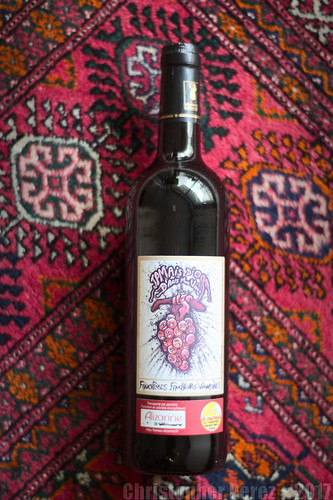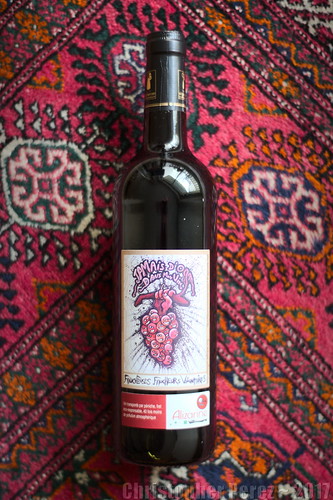France is, of course, the center of all things wine and the fine citizens of Paris consume a fair amount.
A couple hundred years ago just outside the Paris city limits was a vast warehousing district. It was an area called Bercy. Much of what was warehoused there was wine, and it arrived from every wine growing region around France by peniche (aka: barge).
France was, and still is, criss-crossed by a network of canals. All manner of goods were, until the Age of Dinosaur Juice (aka: oil), transported by water.
When Jude and I lived in Hillsboro some twenty plus years ago we watched the series "Barging through France" by Richard Goodwin on PBS. We distinctly remember an episode where Richard and his friend headed out in a Citroen Amie 6 (2CV derivative) in search the summer's wine.
First they sought out a small wine cask (called a tonneau around these parts). Then they went wine tasting. They did this at what was likely one of the last wine fournisseurs in Bercy where they found "a cheeky little bordeaux". It must've been films sometime in the 1970's or 1980's as not a single warehouse remains active today. Today nearly all wine delivered to the city comes by gas or diesel powered camion (aka: truck).
One of the nicest experiences this year came when we visited our German friend in the Jura. She lives several hundred meters from a beautiful canal. If memory serves, the canal she lives near runs from somewhere in central France to the Rhine River. It was peaceful and we enjoyed watching the occasional (mostly pleasure) barge pass. It reminded me of Richard Goodwin's TV show.
Two days ago we went to buy walnuts at our local Bio Coop. We took the opportunity to forage for wine ahead of our annual Salon des Vignerons Independents. Just a little something to tide us over until the end of next month.
At the back of the shop was a small table displaying a couple of bottles of wine. The affiche (label) said something about the transportation of these particular wines being 40 times less polluting than the typical global warming modes of transport. [Note: pre-edit I wrote 40 percent, but no, re-reading the information from Bio Coop it says that transportation by peniche is indeed 40 times less polluting as by camion.] On closer inspection, the wines were completely bio (organic), no sulfites were added for stabilization (a very good thing when trying avoid headaches that sometimes comes with drinking wine), and the red-stuff had been delivered by peniche.
I like the idea that merchandise is starting to move by water, again. Two different reds were on offer, one was a merlot and other a grenache, so we picked up one of each. The prices were very attractive. We'll report back after we've had a chance to taste them. We hope it's decent.
Anything we can do to help save the planet has to be a Good Thing(tm), right?


Richard Goodwin says in the video that he was up on Montmartre looking for the wine village. It may be where he found the small cask. But when I saw the name of the caviste where he had the cask filled with that "cheeky little Bordeaux" I did a little research and found it had a Bercy address. So I imagine that M. Goodwin found the cask up on Montmartre and then found the wine down next to the Seine. Both the cask seller and the caviste appear to have closed their respective doors years ago.
A couple hundred years ago just outside the Paris city limits was a vast warehousing district. It was an area called Bercy. Much of what was warehoused there was wine, and it arrived from every wine growing region around France by peniche (aka: barge).
France was, and still is, criss-crossed by a network of canals. All manner of goods were, until the Age of Dinosaur Juice (aka: oil), transported by water.
When Jude and I lived in Hillsboro some twenty plus years ago we watched the series "Barging through France" by Richard Goodwin on PBS. We distinctly remember an episode where Richard and his friend headed out in a Citroen Amie 6 (2CV derivative) in search the summer's wine.
First they sought out a small wine cask (called a tonneau around these parts). Then they went wine tasting. They did this at what was likely one of the last wine fournisseurs in Bercy where they found "a cheeky little bordeaux". It must've been films sometime in the 1970's or 1980's as not a single warehouse remains active today. Today nearly all wine delivered to the city comes by gas or diesel powered camion (aka: truck).
One of the nicest experiences this year came when we visited our German friend in the Jura. She lives several hundred meters from a beautiful canal. If memory serves, the canal she lives near runs from somewhere in central France to the Rhine River. It was peaceful and we enjoyed watching the occasional (mostly pleasure) barge pass. It reminded me of Richard Goodwin's TV show.
Two days ago we went to buy walnuts at our local Bio Coop. We took the opportunity to forage for wine ahead of our annual Salon des Vignerons Independents. Just a little something to tide us over until the end of next month.
At the back of the shop was a small table displaying a couple of bottles of wine. The affiche (label) said something about the transportation of these particular wines being 40 times less polluting than the typical global warming modes of transport. [Note: pre-edit I wrote 40 percent, but no, re-reading the information from Bio Coop it says that transportation by peniche is indeed 40 times less polluting as by camion.] On closer inspection, the wines were completely bio (organic), no sulfites were added for stabilization (a very good thing when trying avoid headaches that sometimes comes with drinking wine), and the red-stuff had been delivered by peniche.
I like the idea that merchandise is starting to move by water, again. Two different reds were on offer, one was a merlot and other a grenache, so we picked up one of each. The prices were very attractive. We'll report back after we've had a chance to taste them. We hope it's decent.
Anything we can do to help save the planet has to be a Good Thing(tm), right?


No comments:
Post a Comment